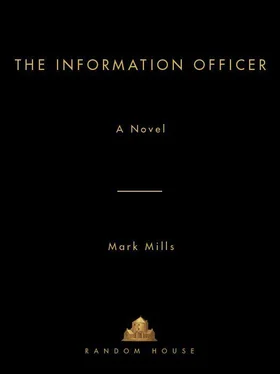Mark Mills - The Information Officer
Здесь есть возможность читать онлайн «Mark Mills - The Information Officer» — ознакомительный отрывок электронной книги совершенно бесплатно, а после прочтения отрывка купить полную версию. В некоторых случаях можно слушать аудио, скачать через торрент в формате fb2 и присутствует краткое содержание. Жанр: Старинная литература, на русском языке. Описание произведения, (предисловие) а так же отзывы посетителей доступны на портале библиотеки ЛибКат.
- Название:The Information Officer
- Автор:
- Жанр:
- Год:неизвестен
- ISBN:нет данных
- Рейтинг книги:5 / 5. Голосов: 1
-
Избранное:Добавить в избранное
- Отзывы:
-
Ваша оценка:
- 100
- 1
- 2
- 3
- 4
- 5
The Information Officer: краткое содержание, описание и аннотация
Предлагаем к чтению аннотацию, описание, краткое содержание или предисловие (зависит от того, что написал сам автор книги «The Information Officer»). Если вы не нашли необходимую информацию о книге — напишите в комментариях, мы постараемся отыскать её.
The Information Officer — читать онлайн ознакомительный отрывок
Ниже представлен текст книги, разбитый по страницам. Система сохранения места последней прочитанной страницы, позволяет с удобством читать онлайн бесплатно книгу «The Information Officer», без необходимости каждый раз заново искать на чём Вы остановились. Поставьте закладку, и сможете в любой момент перейти на страницу, на которой закончили чтение.
Интервал:
Закладка:
“It’s true. They threatened us both in no uncertain terms.”
“But they’re doing something about it. They must be.”
“I wouldn’t bank on it. They don’t want to have the drains up at a time like this. It’s like Elliott said—when the Upstanding leaves, the problem goes with her.”
“The problem?” she fired back crisply. “Is that what you call murderers in your country?”
He raised his hands in placatory gesture. “Don’t get angry with me.”
“But I am angry with you. I’m angry with all of you—the way you treat us, the way you think of us, the way you talk about us. ‘The natives are getting restless’ —I heard that yesterday in the Union Club. And I saw the looks and the smiles. They all thought it was very funny, until they saw me listening. Then they were embarrassed. Good. I’m glad the little native embarrassed them.”
“Lilian—”
“It’s true. You know it is.”
“Not everyone thinks like that, or talks like that.”
“Oh, you’re innocent, are you? I read what you write, and I see the same thing in your words. What was it last week? ‘Malta Can Take It’? Well, good old Malta.”
“That was a line from a BBC broadcast,” he bleated in his defense.
“Yes, Malta can take it, because Malta has got to take it. But we’re not doing it for you; we’re doing it for us.” She slapped her palm against her chest to make her point. “It’s our island. It’s not yours, and it’s not theirs. It’s ours.”
Technically, the island was a British crown colony, but it probably wasn’t the best moment to point out this detail.
“If it wasn’t for us, you’d be under German occupation by now.”
“Well, at least they wouldn’t be dropping their bombs on us.”
“No, we would be.”
The words popped out of his mouth unbidden, illuminating Malta’s grim and perennial predicament, a toothless lump of limestone prey to the whims of mightier nations.
“Don’t you see? People have always come here because they can. But they always leave. If the Germans invade, one day they will go.” She paused. “And one day you will go too.”
Her republican rant had strayed into dangerous territory with that last comment. They both knew it.
“I’m not the only one to think it,” she said defensively.
“I don’t doubt it. But keep it under your hat unless you fancy a holiday in Uganda.”
“And that says it all, doesn’t it?”
He wasn’t going to argue the point, because at heart he agreed with her about the “pro-Italians” and the other “subversive elements” who had been shipped out to Uganda earlier in the year. They’d had a number of heated discussions on this thorny issue, with Max trotting out the official platitude: “Extraordinary times call for extraordinary measures.” When it came down to it, though, there was something chillingly draconian about the stretch of power that allowed the British to intern and deport Maltese citizens at will, without due process. They came from all walks of life—dockyard workers to priests, pensioners to university professors—and not one of them had ever been formally charged with a crime.
It was an injustice that had touched Lilian on a personal level. A friend of hers, the daughter of the chief justice, had spent two years under house arrest with her family before opting to board the Breconshire and follow her father into exile. Sixteen years of loyal service to the crown had, apparently, not been enough to place the family’s loyalty beyond doubt.
“You’re probably right,” conceded Max. “I’m no better than the rest of them. But maybe I’ve learned something. Maybe that’s why I’m here, why I told you.”
“Yes, you tell me, but first you make me swear my silence. I can’t stay silent.”
“You must. They’ll shut you down in a moment.”
“They can’t.”
“They told me they would. That’s what they threatened me with.”
She cast him a curious glance. “They think you care what happens to me?” She seemed almost amused by the idea.
“They’re right. I do.”
She stared down at him, her body now still, the agitation gone. He reached up, took her hand, and drew her back onto the ground beside him.
“You have to trust me. You have to let me do this my way. I need your help—a small favor—but that’s as far as your involvement goes.”
She stared off through the trees.
“What do you want me to do?” she asked eventually, without turning.
At three o’clock, when Max returned to the Information Office, an enemy air raid had yet to materialize over the island, and this had shaped itself into the hopeful speculation that the Luftwaffe had been pulled out of Sicily, summoned back to the Russian front. It had happened before, but never at this time of year, and Max remained skeptical.
At four o’clock, Elliott called from the Combined Operations Room.
“Is there anything on the table?” Max asked.
“Nothing. Niente . Nada. Dead as a dodo.”
“Maybe it’s Hitler’s birthday.”
“That was a couple of weeks back.”
Max laughed.
“It’s true. April twentieth. The sonofabitch just turned fifty-three. You’ve got to hand it to the guy: it takes a special gift to fuck up a planet in fifty-three years.”
“He’s had a little help.”
“True, but I doubt we’d be frying our asses in Malta if young Adolf had been hit by a streetcar on his way to school forty-odd years ago.”
Elliott was calling to confirm their dinner plans and to give Max directions.
“Elliott, I know where you live.”
He’d spent any number of enjoyable evenings on the roof terrace at Elliott’s apartment in Gzira.
“I’m talking about my country residence.”
“Your country residence?”
“You mean you don’t have one? Now grab a pen; it’s a little off the beaten track.”
This was putting it mildly. Wayside shrines, stone gateposts, and oddly shaped trees figured large in the directions.
“Shall we say seven o’clock?”
“With directions like these it might be nearer ten.”
Elliott chuckled. “Well, don’t expect to find any of the Chassagne-Montrachet left.”
The last town of any note before Elliott’s directions degenerated into obscure landmarks was Siggiewi. The road there ran through Qormi and Zebbug, bisecting the low southern plain, passing between the airfields at Luqa and Ta’ Qali. The men had had a whole day to lick their wounds from the previous day’s pasting, and Max could picture the scene: the ground crews and infantry busily filling bomb craters and repairing blast pens, one wary eye on the heavens. The early evening raid was due any moment. The unnatural silence that had hung over the island all day surely had to end soon.
It hadn’t by the time Max had reached Siggiewi. The inhabitants were milling around the main square, moving tentatively, unaccustomed to being aboveground at that hour. Max stopped at a bar near the church and begged a glass of water, not to slake his thirst so much as wash the dust from his mouth. An old man asked him hopefully if the war was over, and when he got back on his motorcycle, a gaggle of barefoot boys chased him through the narrow streets, falling away in dribs and drabs as he opened the throttle.
The rutted road south of Siggiewi wound its way toward the sea and one of the few corners of the island he had never explored. He knew the coastline to the east because that’s where the megalithic temples of Hagar Qim and Mnajdra were to be found, standing like two mini-Stonehenges atop the cliffs. Lilian had insisted he visit them, delivering a lecture on their unique place in the panoply of ancient European sites. She was biased. The professor of archaeology who had whisked her mother off to Italy was a leading expert on Hagar Qim. That’s how the couple had met, some years before the war, during one of the professor’s many visits to his precious temple.
Читать дальшеИнтервал:
Закладка:
Похожие книги на «The Information Officer»
Представляем Вашему вниманию похожие книги на «The Information Officer» списком для выбора. Мы отобрали схожую по названию и смыслу литературу в надежде предоставить читателям больше вариантов отыскать новые, интересные, ещё непрочитанные произведения.
Обсуждение, отзывы о книге «The Information Officer» и просто собственные мнения читателей. Оставьте ваши комментарии, напишите, что Вы думаете о произведении, его смысле или главных героях. Укажите что конкретно понравилось, а что нет, и почему Вы так считаете.










